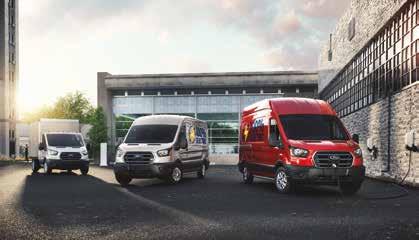
3 minute read
It’s Electrifying!
from H&EN June-July 2023
Van Man,
EV Café started during the first wave of the pandemic to provide a community for those wanting to transition to an electric vehicle and air any questions on the subject. Paul Kirby, Commercial Director at EV Café, otherwise known as the Electric Van Man, is widely recognised as a front runner in the electrification of the van sector. Paul also runs his own consultancy, media, and training business EV Essentials LTD and is the go-to contact for Fully Charged – Robert Llewelleyn’s global YouTube and podcasting sensation for EV’s and clean energy.
Hi Paul! Can you tell us about the current advantages and drawbacks of using electric vans in the event industry?

From a dependability point of view, electric vehicles are less likely to go wrong. So, in your average diesel vehicle there's around 2,000 moving parts. In an electric vehicle, however, there are around 20 moving parts, so what's going to go wrong first? Well, probably the one with the 2,000 parts rather than the 20 moving part vehicle!
The electric vehicle is going to be much better, and much more reliable. When they go wrong, they go wrong, just like everything else. Just like your toaster at home might go wrong, but when's the last time your fridge broke down? Very rarely. And it's always on and it's always doing a job.
Now, there's still challenges with charging infrastructure, and you don't go into that thinking, ‘Oh, it'll be fine.’ You plan and you make sure that you've done your due diligence about if chargers will be available when you get somewhere, is there somewhere on the way, and what happens if something goes wrong. It’s about having a plan A and a plan B and, and these things can be easily tackled.
How do you advise event companies to transition into using an EV?
It's a really important question to ask, because not everybody can jump to electric straight away because they are more expensive upfront. Get to the auction house or get on Autotrader, you'll find electric vans which came from companies who have tried them and have not employed the right mindset: mindset is everything.
After you’ve built a foundation of knowledge, if there is a way that the
Van For The Job
Hospitality and Events North checked out the 2022 Ford E-Transit™, which offers great features, configurability and work-ready accessories, supported by the Ford Pro ecosystem of end-toend charging, telematics, service and financing.

We know the flexibility event organisers and suppliers need, and E-Transit is available in eight different configurations, including three roof heights and three body lengths, plus cutaway and chassis cab versions to fulfil multiple applications. E-Transit can be further customized with the addition of vocational bodies (on chassis cab and cutaway) and equipment like ladder racks and interior bulkhead and storage solutions.
Ev
deliver event stock.
company can begin to take on a lease, or a short-term lease, to test and see if the vehicle works for them, that will begin the transition process. There are a number of companies around the country that are able to provide vehicles for one month or more so that people can kind of go ‘right, okay, I’ve got a few events on let's see if this can work’ and they're reasonably competitive costs too.
There is a higher cost of buying, but then there's a lower cost of fuelling those vehicles. So, what I would suggest to a smaller business with less income who are managing smaller budgets is to look at the total cost of ownership.
Will electric vans be able to carry the same amount of weight as a diesel van?
The vans themselves are exactly the same in terms of physical space. That's not going to change. If it was 17 cubic metres before it will be 17 cubic metres afterwards, that bit has been protected. The payload is the one thing that's critical. There is a mile range and payload compromise to consider. There are two battery sizes of 50 and 75. And the difference between those two vehicles is 50 miles extra range on the 75, and 200 kilos more payload on the 50. So, what do you need more range or more payload?
Single-use plastic products have long been a staple in the hospitality and events industry due to their convenience and affordability. However, their detrimental impact on the environment cannot be ignored.
The ban, which comes into force on 1st October, will target a variety of items such as plastic straws, cutlery, plates, and food containers. Additionally, single-use plastic bottles, balloons, and packaging materials will also face restrictions.
While this will undoubtedly pose challenges as the industry adapts, it can also serve as an opportunity to explore innovative and creative solutions.
Planning ahead
In terms of planning for the ban, it’s crucial to identify the items which will be affected (plastic plates, bowls, trays, containers, cutlery, and balloon sticks are all on the government list). This will allow businesses to create a plan for transitioning to ecofriendly alternatives.
Next, it’s important to evaluate your supply chain and engage with suppliers who prioritise sustainability, ensuring a smooth transition and reliable access to products which align with the new regulations. Finally, it’s a good idea to educate staff and clients about the ban and the reasons behind it. This awareness will help foster

